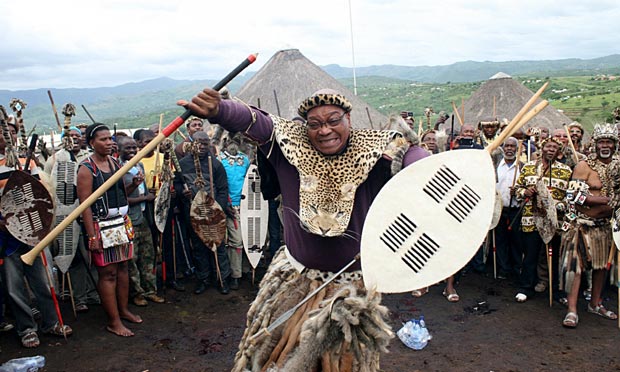-
1 April 2016
- From the sectionAfrica
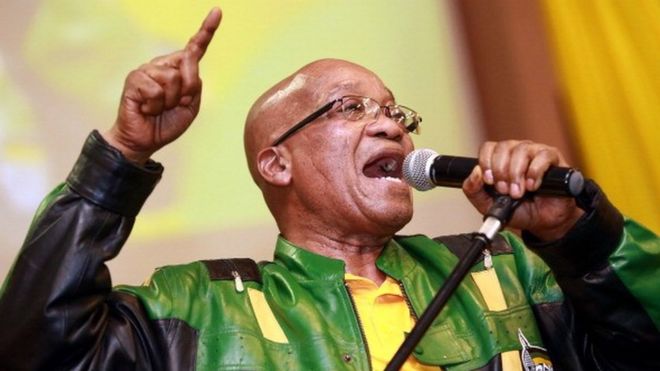 Image copyrightAFP
Image copyrightAFPJacob Zuma is the most colourful and controversial president South Africa has had since white-minority rule ended in 1994.
He was born into poverty, went into exile to fight apartheid and has been embroiled in a series of scandals, which would have ended the careers of many politicians.
His poor roots, charisma and strength in adversity partly explain his ability to hold on to power, despite calls for his resignation and attempts to oust him as ANC leader.
His credibility was most severely damaged in March 2016 when South Africa’s highest court ruled that he violated the constitution by failing to repay the government for money used on upgrading his private residence, including building a cattle enclosure, amphitheatre, swimming pool, visitor centre and chicken run. The president apologised to South Africans for the “frustration and confusion” caused by the scandal vowed to pay the money.
Mr Zuma’s private life has also grabbed the headlines, and has caused much controversy.
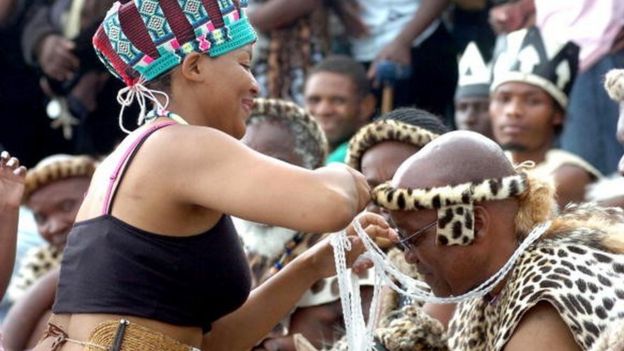 Image copyrightAFP
Image copyrightAFPThe 73-year-old is a proud polygamist – following a Zulu tradition – and currently has four wives. He is also known for his infidelity and has fathered a child with another woman.
His political career was written off in the run-up to the 2009 election when he was simultaneously battling allegations of rape and corruption.
He was acquitted of rape, though the corruption case has proved harder to shake off.
He always denied charges of money-laundering and racketeering, stemming from a controversial $5bn arms deal signed in 1999 and had said he would resign if found guilty of wrong-doing.
‘Intellectual king’
The case was controversially dropped by the National Prosecuting Authority (NPA) just weeks before the elections which saw him become president.
Some seven years later, the opposition is still fighting for the charges to be reinstated and has asked the courts to review the NPA’s decision. There is yet to be a ruling.
At the time of his election as president in 2009, Mr Zuma’s supporters saw his charismatic popular touch as a refreshing contrast to Thabo Mbeki, who was seen as a rather aloof president.
“He is a man who listens; he doesn’t take the approach of an intellectual king,” said one unnamed supporter, in an apparent swipe at Mr Mbeki, whose allies were accused of spearheading Mr Zuma’s prosecution after he had wrested control of the ANC in 2007.
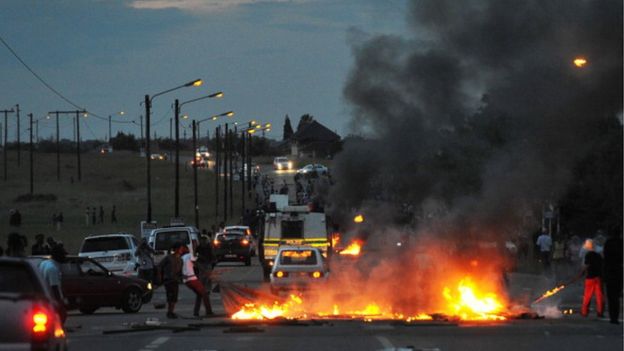 Image copyrightAFP
Image copyrightAFPMr Zuma’s modest upbringing and promotion of traditional family values are seen as a major factor in his enduring popularity among many poor South Africans, especially in rural areas.
Impromptu theatre
His rise to power earned him the name “the people’s president”, but this carefully crafted image lay in tatters following the controversy over the upgrading of his residence in the rural area of Nkandla in northern KwaZulu-Natal.
ANC supporters heckled and booed him in front of foreign dignitaries – including US President Barack Obama – at a memorial in Johannesburg following the death of South Africa’s first black leader, Nelson Mandela, in December 2013.
“He is eating when we are hungry,” one protester said, capturing the public anger over the Nkandla upgrade.
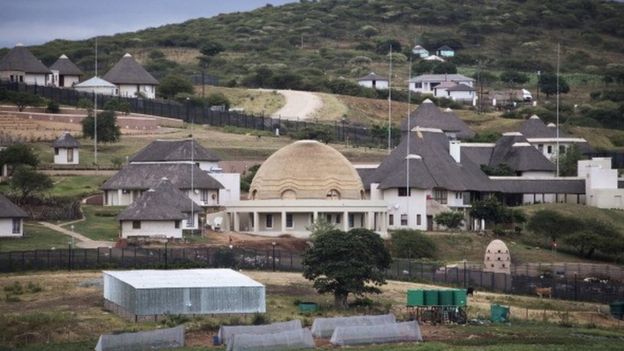 Image copyrightAFP
Image copyrightAFP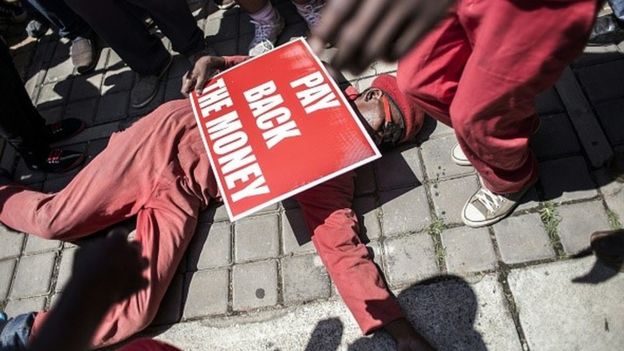 Image copyrightAFP
Image copyrightAFPNkandla was where he was born on 12 April 1942. Brought up by his widowed mother, he had no formal schooling.
He joined the ANC at the age of 17, becoming an active member of its military wing, Umkhonto We Sizwe, in 1962.
He was convicted of conspiring to overthrow the apartheid government and imprisoned for 10 years on the notorious Robben Island, alongside Mr Mandela.
Mr Zuma, popularly known as “JZ”, is said to have helped keep up morale among the incarcerated ANC grandees with songs and impromptu theatre – it was that comical nature which endeared him to ordinary South Africans before his elevation to the presidency.
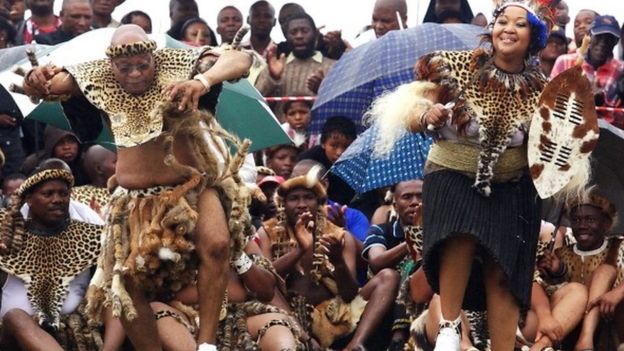 Image copyrightAFP
Image copyrightAFPAfter being freed from prison, Mr Zuma left South Africa, living first in Mozambique, then Zambia, as he rose through the ANC ranks to the executive committee.
He became one of the first leaders to return home in 1990 – when the ban on the ANC was removed – to take part in negotiations with the white-minority government.
While trying to oust Mr Mbeki, he enjoyed strong support among trade unionists and the communist party – an ANC ally – as they believed he would redistribute South Africa’s wealth in favour of the poor.
They said Mr Mbeki was too business-friendly and had presided over “jobless growth”.
However, Mr Zuma has not changed South Africa’s economic policy and many of his erstwhile allies, such as firebrand youth leader Julius Malema, have since dropped him, accusing him of not doing enough to help the poor and of presiding over a corrupt government.
Ridiculed
His private life has not helped this impression.
Married six times in total, Mr Zuma has 21 children and has married twice since becoming president in lavish traditional ceremonies in Nkandla.
One of his wives, Mozambican Kate Mantsho, took her own life in 2000, while his ex-wife, Nkosazana Dlamini-Zuma, is now chairperson of the African Union commission.
Zuma’s wives:
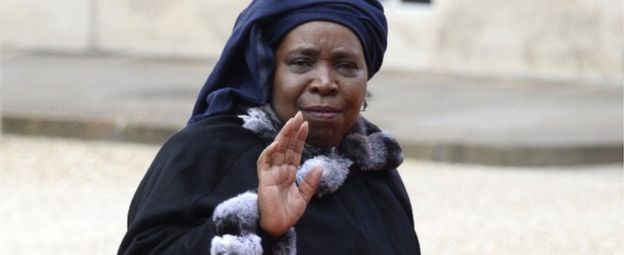 Image copyrightAFP
Image copyrightAFP- Gertrude Sizakele Khumalo (married in 1973)
- Nompumelelo Ntuli (2008)
- Thobeka Madiba (2010)
- Gloria Bongi Ngema (2012)
Ex-wives:
- Nkosazana Dlamini-Zuma (married in 1972; divorced in 1998)
- Kate Mantsho (married in 1976; died in 2000)
Some analysts believe that with Mr Zuma due to step down as ANC leader in December 2017 and as president after general elections in 2019, he intends to back Ms Dlamini-Zuma as his successor in the hope that she will shield him from any further corruption investigations.
In 2006, Mr Zuma was acquitted of raping an HIV-positive family friend, but his statement during the trial, that he showered after unprotected sex with the woman to guard against possible infection, provoked ridicule.
Four years later, he admitted that he had had a baby with the daughter of another family friend.
‘Grinding his enemies’
He was again accused of undermining the government’s HIV/Aids policy, which urges people to be faithful and use condoms.
But as president he won over many critics and activists when he announced a major overhaul to the country’s Aids policy in December 2010 – this has seen a drastic increase of the roll-out of life-saving anti-retroviral (ARV) drugs.
South Africa has an estimated five million people living with HIV – more than any other country.
Mr Mbeki had denied the link between HIV and Aids and his government had always said ARV drugs were too expensive to distribute to all who needed them.
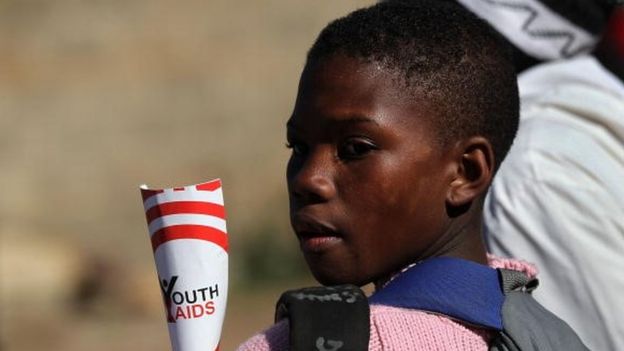 Image copyrightAFP
Image copyrightAFPBut that has been one of Mr Zuma’s few unqualified successes.
The economic situation has been worsening, and there are almost daily protests by people demanding better basic services such as housing, schools, water and electricity.
More worrying for Mr Zuma, there are growing concerns within the ANC about corruption and cronyism, following allegations that the wealthy Gupta familyinfluences cabinet appointments.
Both Mr Zuma and the Guptas have denied the allegation, but the ANC has ordered an investigation into what its secretary-general Gwede Mantashe has called the “corporate capture” of government.
Some analysts believe that with Mr Zuma coming under pressure on various fronts, it is a matter of time before he is is forced to step down.
However, others say it is unwise to write off the man whose Zulu name, Gedleyihlekisa, means one who smiles while grinding his enemies.
http://www.bbc.com/news/world-africa-17450447

